11 Free SEO Tools To Improve Your Website’s Search Engine Ranking
Maximize your website's online potential with these 11 free and effective SEO tools. Improve your search engine ranking & drive more traffic to your site.
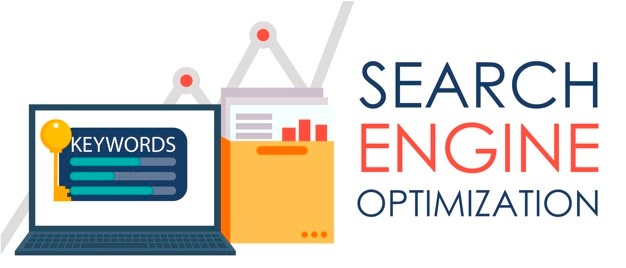
Are you looking to boost your website's search engine ranking without breaking the bank? Optimizing for SEO (Search Engine Optimization) doesn’t have to come with a high cost. In fact, with the right free tools, you can improve your site’s visibility, drive more organic traffic, and achieve better results across search engines—all for free.
This guide reveals 11 essential free SEO tools designed to help you:
-
Increase Website Speed: Use website speed checkers to improve user experience, which is critical for better SEO rankings.
-
Analyze Traffic Trends: Understand user behavior with website traffic analysis tools, giving you insights to refine your SEO strategy.
-
Master Keyword Research: Discover keywords your audience is searching for with powerful research tools, helping you enhance your content for targeted traffic.
-
Create Engaging Content: Content research tools reveal trending topics and formats, allowing you to craft valuable, high-converting content.
-
Outsmart Competitors: Learn from competitor analysis tools to find gaps and refine your approach for a competitive edge.
-
Optimize for Clicks: Preview how your page appears in search results with a SERP simulator, refining meta tags for better CTR.
-
Make Informed Decisions: Analytics tools provide insights into traffic sources, audience demographics, and performance to guide your SEO tactics.
-
Build Quality Backlinks: Identify backlink opportunities that boost authority with free backlink tools, focusing on quality over quantity.
With these free tools, you’re ready to take actionable steps toward SEO success. Let’s dive in and transform your website’s online presence!
SEO Demystified: Ranking Higher Without Breaking the Bank
Ever wonder how some websites seem to magically appear at the top of search results, while yours struggles to be seen? The answer is SEO, or Search Engine Optimization. It's the art and science of getting your website noticed by search engines like Google, leading to more organic traffic (visitors who find you naturally).
Maximize Your Online Presence with Our Digital Marketing Agency
-
SEO: Unlock more SEO traffic and see real results with our expert optimization services.
-
Content marketing: Attract and retain customers with high-quality, engaging content that drives traffic and generates leads.
-
Social media marketing: Our team creates epic content that will get shared, get links, and attract traffic on social media platforms.
-
Google Ads: Effective paid strategies with clear ROI. Let our team help you get the most out of your ad spend.
-
Email marketing: Connect with your audience and drive conversions with targeted email campaigns.
-
Web design and development: A visually appealing and user-friendly website is key to attracting and retaining visitors. Our team can help you create a website that converts.
The SEO Breakdown: 4 Key Pillars for Success
SEO isn't a one-size-fits-all magic trick. It involves optimizing various aspects of your website to attract search engines and users alike.

Here's a breakdown of the four main pillars:
-
Keywords: These are the terms users search for online. Identifying and strategically incorporating relevant keywords is crucial for search engines to understand your website's content and connect it with relevant searches.
-
Technical SEO: This focuses on the website's backend, ensuring it's search engine friendly. Think of it as building a solid foundation for your website. Fast loading times, clear structure, and mobile responsiveness are all crucial technical SEO aspects.
-
Content: Content is king! High-quality, informative, and engaging content keeps users coming back for more. It also signals your expertise to search engines, improving your ranking.
-
Backlinks: Imagine these as votes of confidence from other websites. The more high-quality backlinks your site has, the more authoritative it appears to search engines, positively impacting your ranking.
Exploring the SEO Landscape: Different Types for Different Needs
Now that you grasp the core principles, let's delve into the various SEO types:
-
On-Page SEO: This focuses on optimizing individual website pages for relevant keywords, ensuring titles, headings, and content all work together to tell search engines and users what your page is about. Dive deeper with our guide: Conquer Search: The Effortless Guide to On-Page SEO.
-
Technical SEO: As mentioned earlier, this tackles the technical aspects to ensure search engines can easily crawl and index your website. Fast loading times and a mobile-friendly design are crucial here. Learn more about mastering Technical SEO: Unlock Top Rankings..
-
Off-Page SEO: This focuses on building your website's authority and credibility outside your domain. Guest blogging, link building from reputable sources, and social media engagement are all part of the off-page SEO strategy. Unlock the secrets to 2024 Search Success with our guide to Off-Page SEO: Off-Page SEO: Unlocking the Secrets to 2024 Search Success.
-
Local SEO: This caters specifically to businesses with a local presence. Optimizing your website and online listings with local keywords and NAP (Name, Address, Phone) consistency helps you rank higher in local search results, attracting nearby customers. Learn how to dominate your town's search results with our Local SEO guide: Local SEO: Dominate Your Town's Search Results.
11 Free SEO Tools to Skyrocket Your Website's Rankings
Google PageSpeed Insights - Unleash Blazing-Fast Website Speed
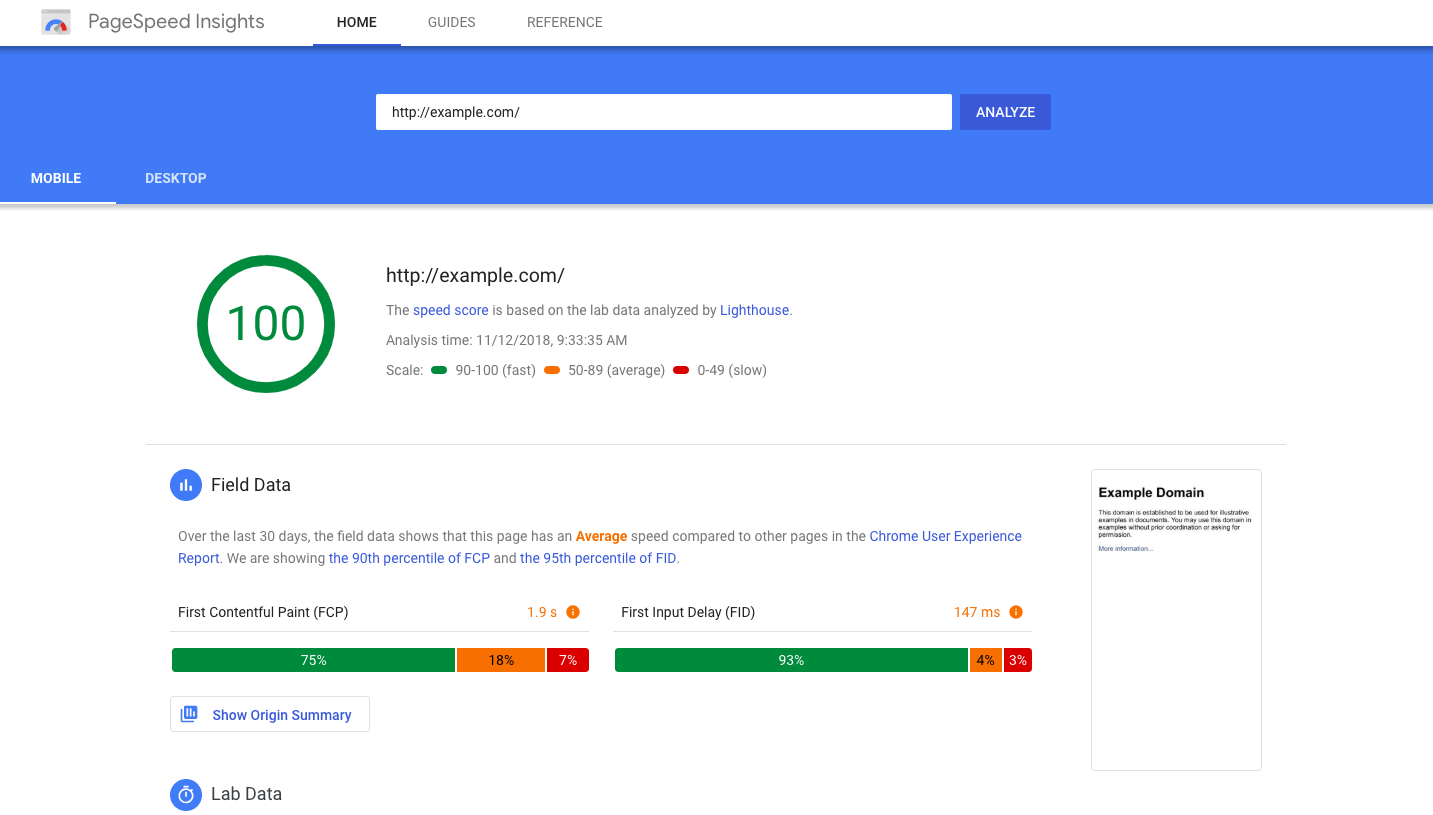
Why Website Speed Matters
Imagine waiting ages for a web page to load. Frustrating, right? That's exactly what visitors experience with slow websites. Google prioritizes fast-loading sites in search rankings, and users are more likely to bounce from a slow page.
Enter Google PageSpeed Insights
This free tool by Google analyzes your website's speed and performance on mobile and desktop devices. Simply enter your website URL, and watch it generate a performance score (0-100) alongside actionable insights for improvement.
Optimize for Speed, Reap the Rewards
Use Google PageSpeed Insights to identify areas that slow down your website, like large images or clunky code. By optimizing your site for speed, you'll create a better user experience, improve search ranking, and potentially see a boost in conversions.
SERP Simulator - Craft Winning Snippets for Search Glory
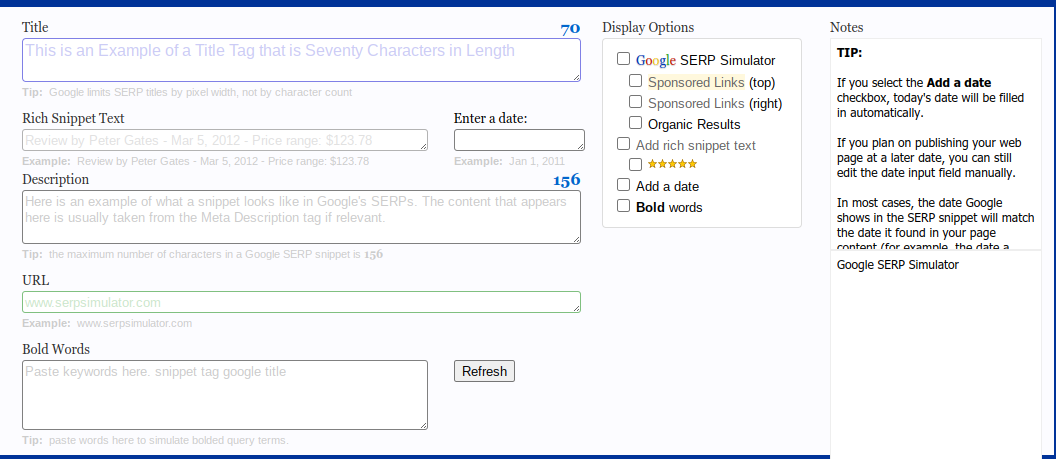
Ever wondered how your website title and description will appear on search engine results pages (SERPs)? This is where SERP Simulator comes in.
See Your Search Snippet Before It Goes Live
Imagine hitting publish and then realizing your title and meta description are cut off or don't accurately reflect your content.
With SERP Simulator, you can preview how your search snippet will look on Google, ensuring it's clear, concise, and enticing to users.
Optimize, Don't Guess
Use this tool to craft compelling titles and meta descriptions that are relevant, unique, and within Google's character limit. By optimizing your snippets, you can increase click-through rates and attract more qualified traffic to your website.
Google Analytics: Website Tracking and Monitoring Powerhouse
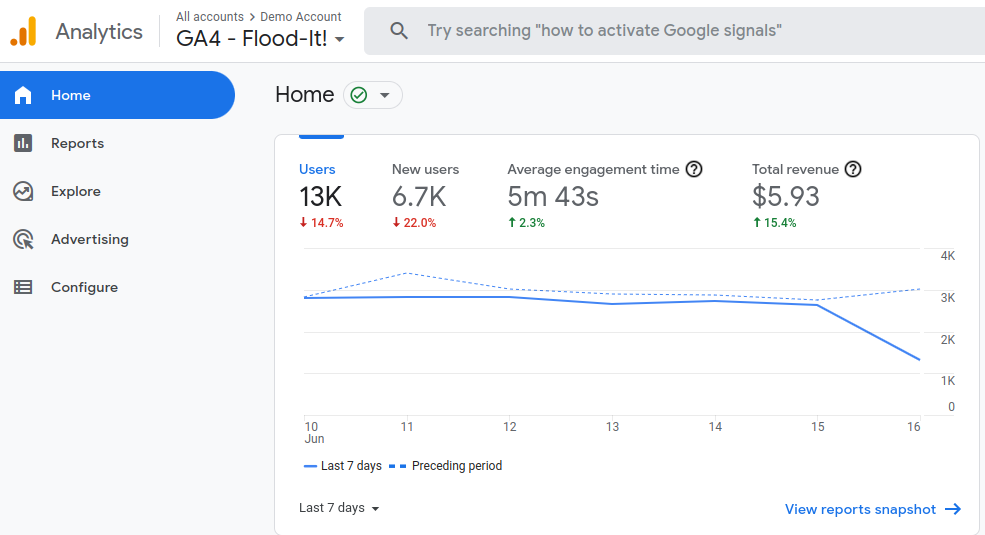
Google Analytics reigns supreme as the most popular tool for website owners and marketers. It provides a comprehensive suite of website statistics, including:
-
Page impressions
-
Bounce rate
-
Sessions
-
Unique visits
-
Organic traffic
With Google Analytics, you gain invaluable insights into your website's performance.
Uncover Hidden Gems and Potential Issues
This tool is particularly helpful for those less familiar with technical SEO aspects. It can help you identify potential problems that may be negatively impacting your website ranking, such as very low bounce rates or spammy backlinks.
Understanding Your Audience is Key
Google Analytics empowers you to understand where your visitors are coming from and their actions upon reaching your site. You can see their browsing journey, how long they stay on specific pages, and which ones resonate most.
Keyword Insights to Optimize for Success
This tool even unveils the keywords driving traffic to specific pages. This goldmine of information allows you to optimize those pages for maximum effectiveness, ensuring they rank higher for relevant search terms.
Google Search Console: Your Website's Health Checkup
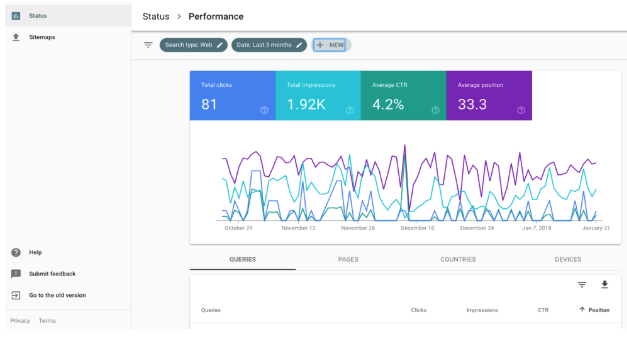
Google Search Console is a treasure trove for website analysis. Use it to ensure your website is:
-
Mobile-friendly and easy to navigate
-
Properly indexed by search engines
-
Free from broken links and technical errors
One of Google Search Console's most powerful features is the ability to monitor your top keywords and their ranking on Search Engine Results Pages (SERPs). This invaluable data provides a clear picture of your website's performance and areas for improvement.
Deepen Your SEO Knowledge: Elevate Your Website with Google
For a comprehensive dive into mastering SEO with Google Search Console, explore our in-depth guide: Elevate Your Website: Mastering SEO with Google Search Console.
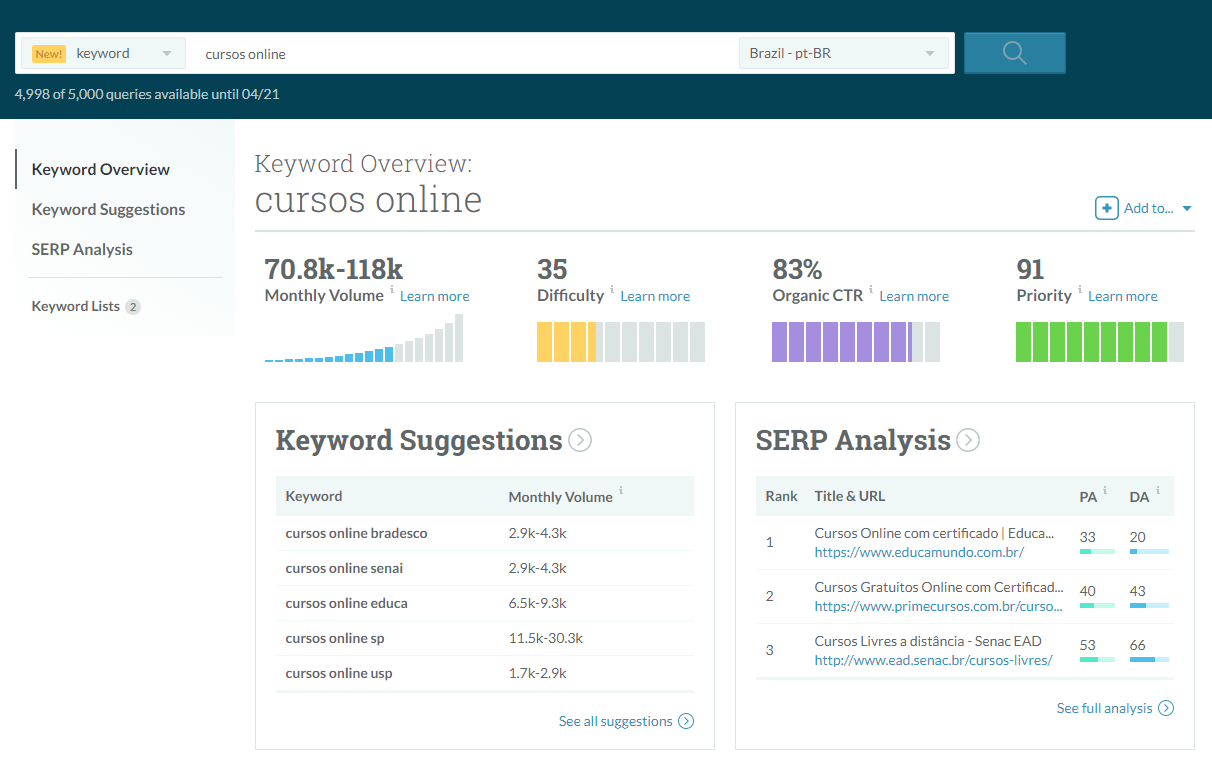
Used for: Keyword research
Moz is an SEO tool that makes it easy to create SEO-friendly content.
The key to success in search engine marketing is a strong content strategy. Moz has a suite of tools that make it easy to create SEO-friendly content, which is crucial for increasing visibility in search results.
By using this tool, you can optimize your content and build links to your website, which will end up bringing in more traffic and better rankings.
Moz features a variety of tools that can help you improve your SEO. One of those tools is Keyword Explorer. This tool enables you to do better keyword research in less time. Identify which keywords your site could rank right and find high-impact suggestions.
Just enter a keyword and then it will help you uncover related keywords and phrases that you can use to optimize your site. This is a really powerful tool that helps you get quality content!
Yoast SEO
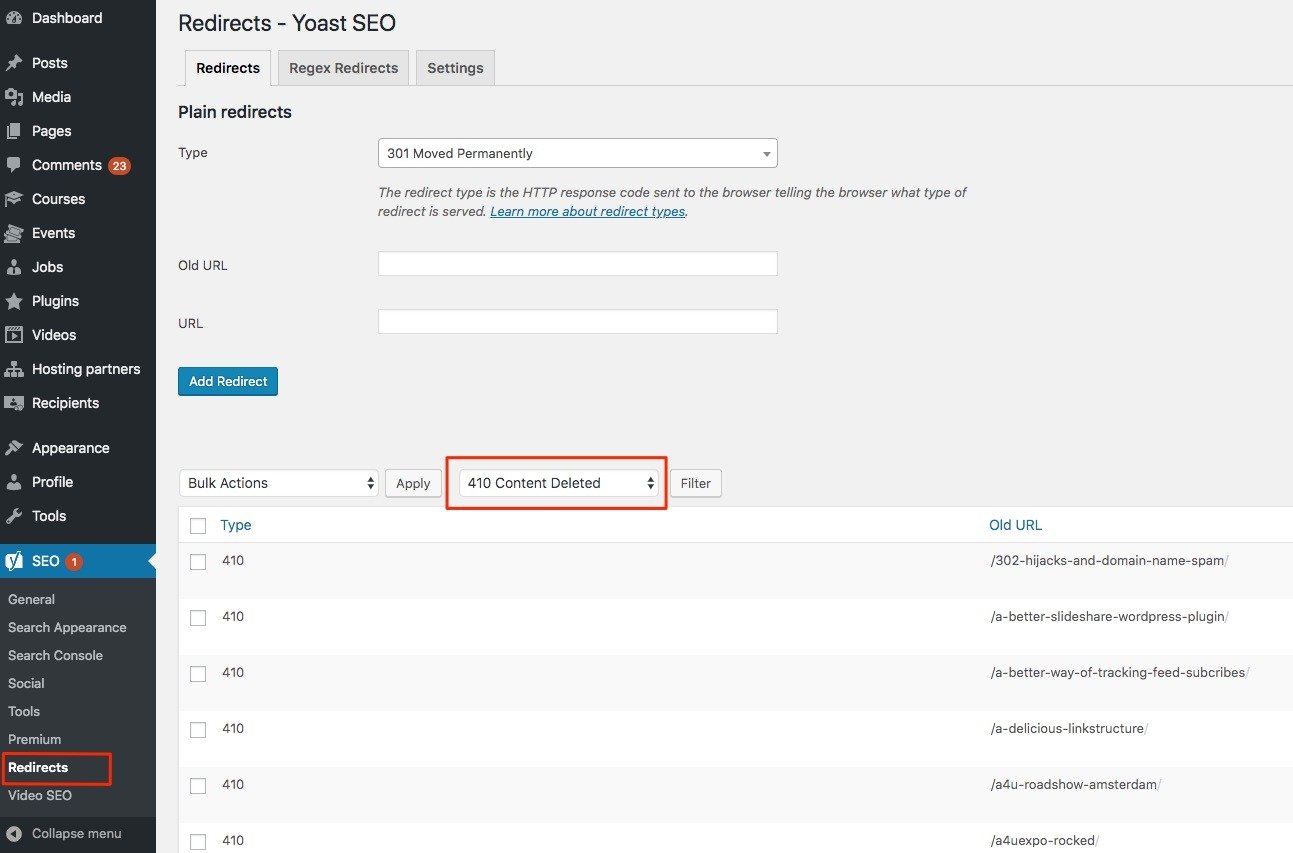
Used for: Optimizing blog posts for search engines.
Yoast SEO is a popular plugin for WordPress that improves your website’s rankings on search engines by helping you optimize your site’s content and keywords. A lot of what Yoast SEO does is automated but still needs your input and some planning.
Once installed on your WordPress site, the Yoast SEO plugin will appear on each of the pages and posts you create, it then analyzes the content of the pages and provides suggestions on how to improve it by giving you a score, telling you what problems there are and how to improve your content for SEO.
SimilarWeb
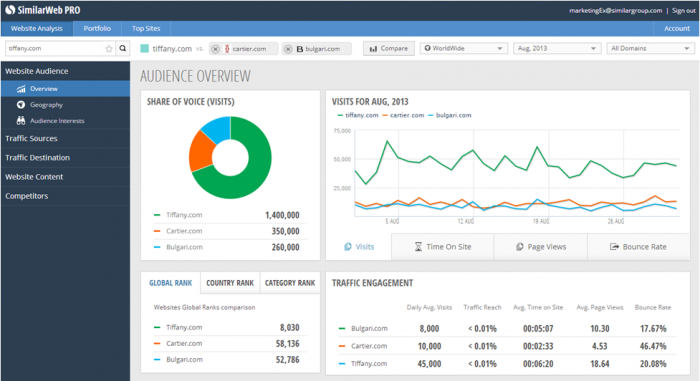
Used for: View site stats for any domain.
SimilarWeb is a tool that estimates the total amount of traffic different websites get.
It allows you to see competitors’ top traffic sources, broken down into different categories including referring sites, social traffic, and top search keywords.
It is a great tool to use when doing competitor research as it provides a detailed breakdown of everything you need to check the status of any domain.
Also read: What is the role of SEO in digital marketing?
This is a very helpful tool you can use to analyze how a competitor might be growing their audience and understand the best ways to do the same so that you can also rank higher and grow your own site’s traffic.
Ubersuggest
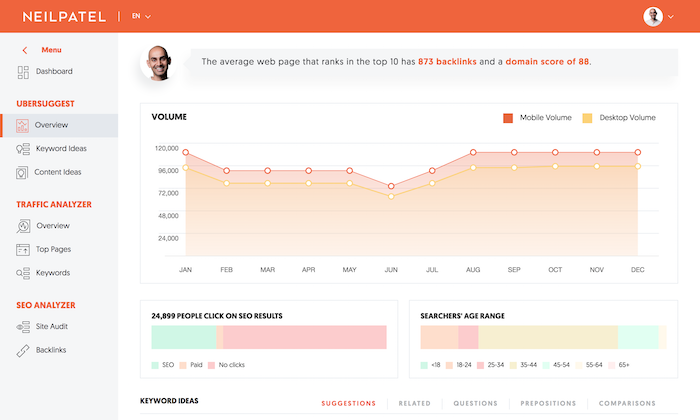
Used for: Generating new keywords and content ideas
If you’re looking for a great tool to help you with your content marketing goals, look no further than Ubersuggest.
Founded by entrepreneur and SEO guru Neil Patel, Ubersuggest has been around for years, but that doesn’t change the fact that it’s one of the best SEO tools on the market.
Anyone can use the tool to figure out what people are searching for online and how they can best fill that need through their content.
It’s a perfect tool to use when trying to find new ways to fill your social media or content calendar. The tool also shows you related long-tail keywords and suggests content ideas based on your keyword.
XML-Sitemaps
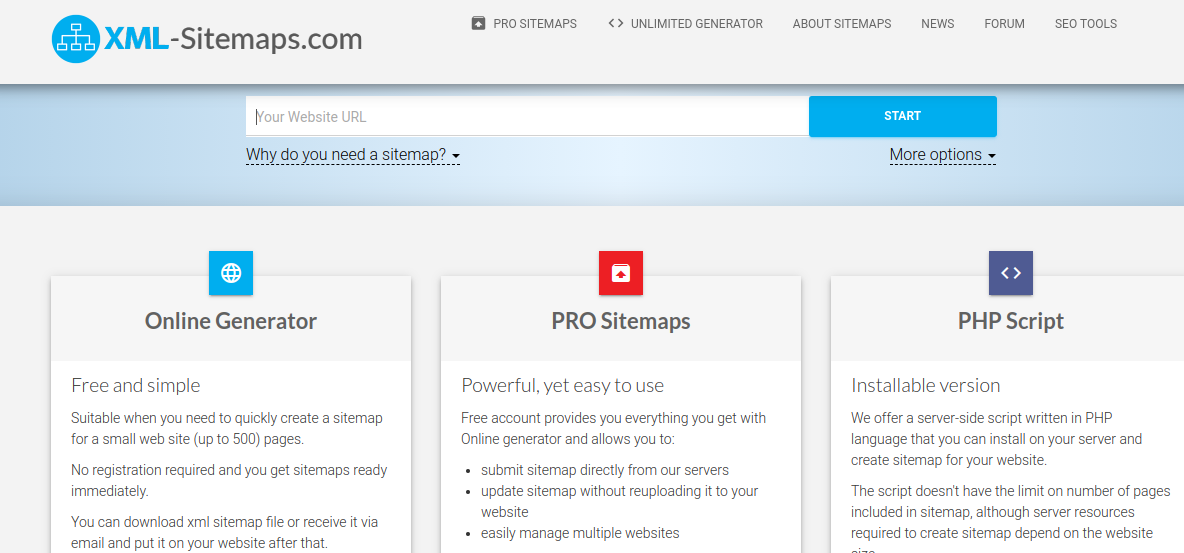
Used for: Sitemap Generation
A sitemap allows search engines to learn about the content of a website, which is crucial for Search Engine Optimization. Nevertheless, they may be too technical for some small businesses or SEO newbies to generate.
And that is where XML sitemaps come in. With XML sitemaps, creating sitemaps has become as simple as ABC. All you need is to go to their website, enter your website's primary URL, click on start and your sitemap will be generated automatically in seconds!
You can then download the sitemap and submit it to any search engine, including Google, Bing, and Yahoo.
Semrush
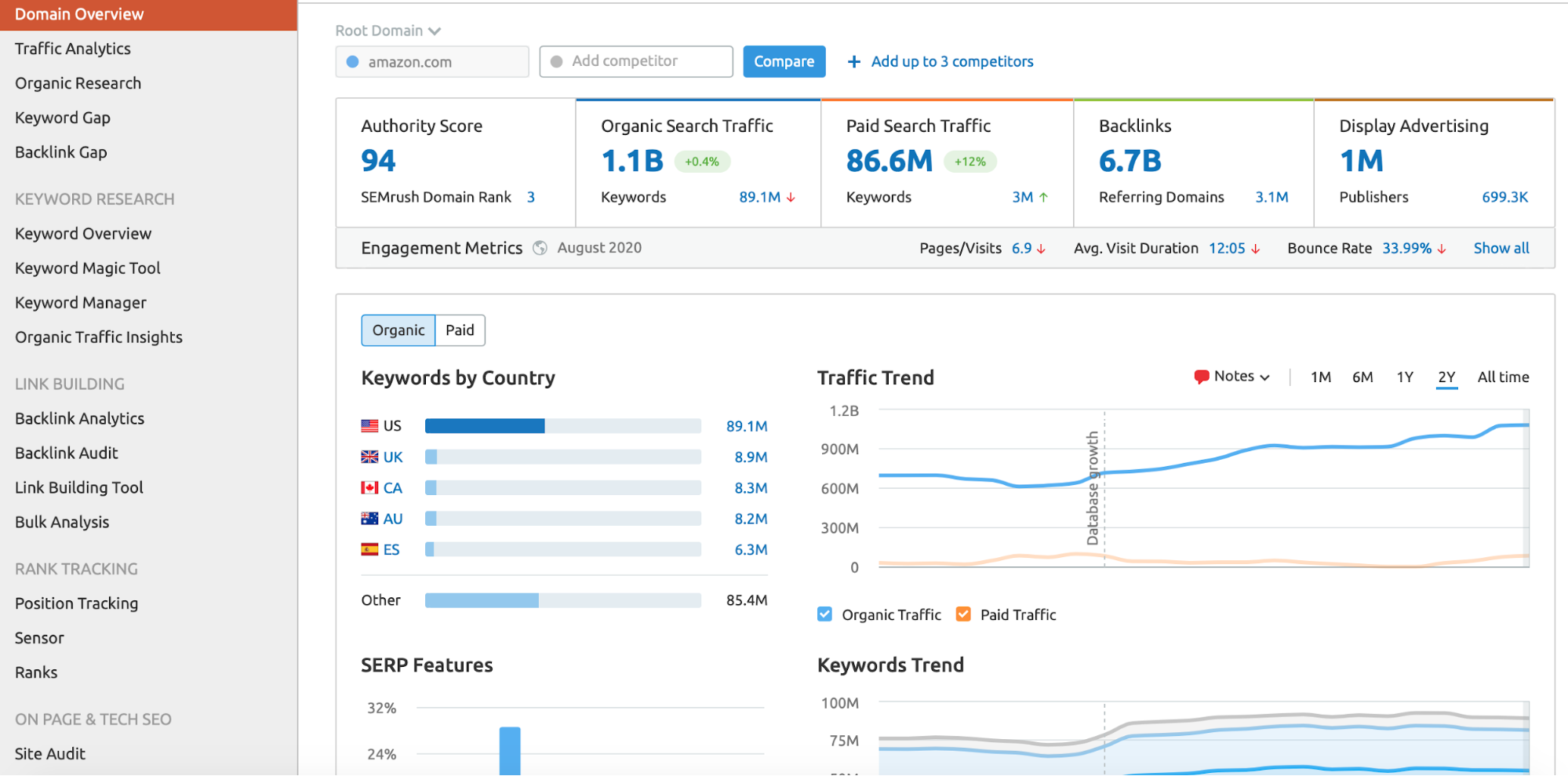
Used for: Generating new keywords and content ideas
SEMrush is a keyword research tool made to help you find the right keywords to optimize your site and content. It has tons of great features to help your business succeed online.
The keyword search feature is useful for improving your on-site SEO and content.
You can also track your competitors' keywords and content to see how you're doing compared to them.
This tool will help you and your team develop new ideas about how to improve your website and content.
Also read: Online Digital Marketing Courses: Sites To Get Certifications (Paid & Free)
Ahrefs Webmaster Tools
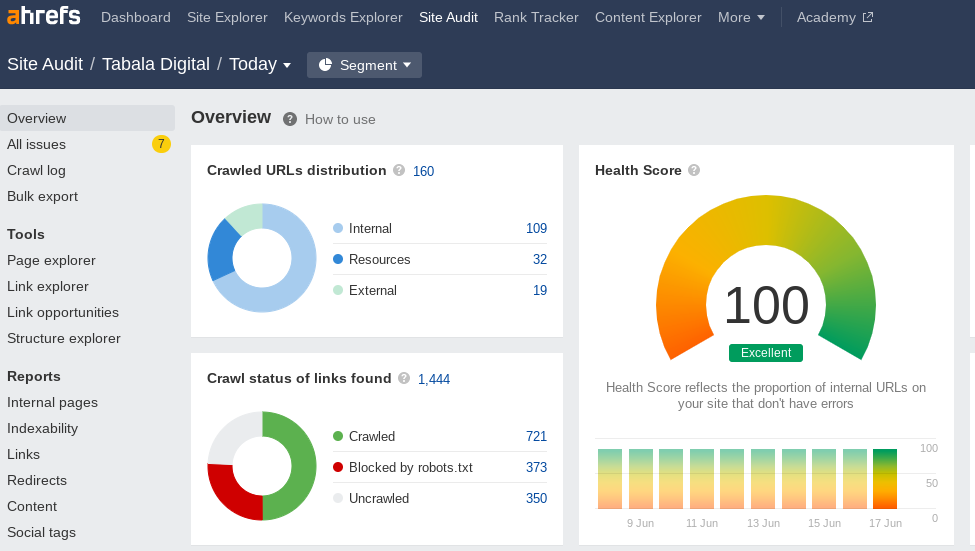
Used for: Analyzing a website's link profile, keyword rankings, and SEO health.
Ahrefs is a powerful tool for analyzing and managing SEO campaigns. It helps you discover the keywords that your competitors rank for in Google, what search queries they are using to rank, and where they are getting backlinks.
Use Ahrefs to research keyword opportunities and know how you can use your backlinks to help you beat out your competitors. The tool also contains a quarantine feature that allows you to delete links that have been flagged for spam by Google and other search engines.
A handy feature for anyone fighting a link war. Takes some time to get used to this tool but it’s worth it.
Sign up for Ahrefs Webmaster Tools, verify your website, and get over 100+ technical SEO issues. The tool also gives suggestions on how to fix them.
Do you need more SEO tools? Check out The Top 5 Cutting-Edge AI SEO Tools.
Conclusion
In conclusion, these free SEO tools offer a fantastic starting point to help optimize your website and attract potential customers. SEO is a complex, ever-evolving field that requires a mix of marketing insight, technical skill, and an understanding of user behavior.
But remember, these tools are only part of the journey—real success comes from using them to drive meaningful traffic and grow your business. We hope these tools will inspire and empower you to take your SEO efforts to the next level!
Need more hands-on support? Check out our SEO services or contact us today. As Kenya's leading SEO agency, we’re here to help you achieve exceptional results.
Which of these 11 tools will be your go-to for SEO? Or is there a favorite tool you think we missed? Let us know—we’d love to hear from you!

Strategist Profile
Abala Tom
Digital systems strategist specializing in high-performance SEO, Google Ads, and conversion optimization. Mission: to replace marketing 'guesswork' with predictable revenue systems.